Emiliana Rodriguez’s childhood memories are a blend of joy and sorrow, intertwined with the haunting specter of a silent killer lurking in the darkness. Growing up in Bolivia, she vividly remembers evenings spent watching her friends play soccer under the moonlit sky. But one fateful night, the game was abruptly halted by the tragic passing of a player, a victim of the insidious disease known as Chagas.
For Rodriguez, the incident cast a long shadow of fear over the night. In the folklore of her upbringing, Chagas was depicted as a monstrous presence that emerged under the cover of darkness, claiming lives without warning. This narrative became all too real when she learned that her friend had succumbed to this silent and silenced disease, one of the thousands who perish annually from its grasp.
Now, at 42 years old and living in Barcelona for over two decades, Rodriguez still grapples with the specter of Chagas that haunts her past. “The terror would grip me at night”, she confides. “There were times when sleep eluded me, fearing that I might never wake up again.”

Her own confrontation with the disease came to light eight years ago, during her first pregnancy. The revelation of her status as a carrier sent shockwaves through her, evoking memories of her childhood trauma. “I felt paralyzed with fear”, she recalls. “The thought of what might happen to my unborn child kept me awake at night.”
Yet, despite the looming threat, Rodriguez embarked on a journey of treatment to safeguard her child from the same fate. Thanks to medical intervention, her daughter emerged unscathed, spared from the clutches of the silent killer that had haunted her family’s history.
Rodriguez’s story is not unique. Across the globe, individuals like Elvira Idalia Hernández Cuevas of Mexico find themselves thrust into the unfamiliar terrain of Chagas disease. For Idalia, the journey began with a routine act of altruism, donating blood. Little did she know that this act would expose her to a hidden danger lurking within her own community.
“When I first heard the diagnosis, I was terrified”, Idalia recounts. “I had never even heard of Chagas before, let alone imagined that I could be its victim.”
Her experience echoes a broader reality, one where awareness of Chagas remains dangerously low, even in regions where the disease exacts its heaviest toll. Originating in the Americas, Chagas has since spread its reach to other continents, ensnaring millions in its silent grip.
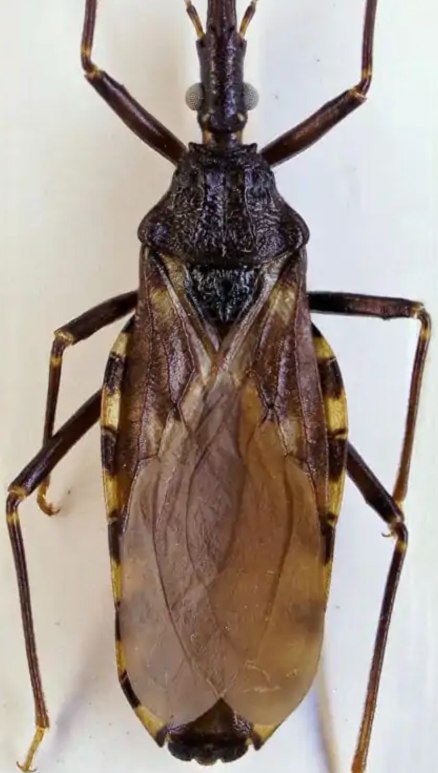
In the face of this silent epidemic, efforts to combat Chagas are hindered by a lack of awareness and resources. Outdated treatments offer little solace to those afflicted, with medications often proving toxic and ineffective, particularly for newborns.
Yet, amidst the darkness, there are glimmers of hope. Champions like Emiliana Rodriguez and Elvira Idalia Hernández Cuevas are raising their voices to break the silence surrounding Chagas. Through advocacy and awareness campaigns, they seek to shine a light on this neglected disease, urging communities to confront the monster lurking in their midst.
As the world grapples with the challenge of eradicating Chagas by 2030, the road ahead remains daunting. But with each voice raised in solidarity, the hope for a future free from the shackles of Chagas grows stronger.
In the battle against this silent killer, knowledge is our most potent weapon. By arming ourselves with awareness and understanding, we can confront Chagas head-on, ensuring that no more lives are claimed by the darkness.
My Husband Gave His Mother All Our Savings Without Asking Me — So I Taught Him a Lesson He’d Never Forget

When I got a notification that nearly all our savings had been drained from our joint account, I assumed it was a hack or a mistake. It wasn’t. My husband, Mark, had done the unthinkable, and what I did next ensured he’d never forget it.
There’s a saying that you can tell a lot about a man by the way he treats his mother.
In Mark’s case, I learned that sometimes, a man can treat his mother too well. For years, I let it slide, but this time, he crossed a line so bold it couldn’t be ignored.

A woman standing outdoors | Source: Midjourney
To be honest, Mark wasn’t a bad man.
He was a decent father, a loyal husband, and a diligent worker. But there was one glaring flaw in his otherwise steady demeanor. His mother, Melissa.
At 71, she wielded an influence over him that defied logic.
If Melissa wanted something, Mark would find a way to make it happen, no matter how ridiculous or inconvenient it might be.

A man standing in a kitchen | Source: Midjourney
One time, she decided she needed a new car, and Mark co-signed a loan we could barely afford.
Another time, she convinced him to buy her a state-of-the-art recliner because “her back couldn’t take the old one anymore.”
These decisions, while irritating, never truly jeopardized our marriage.
But this time was different.

A woman looking outside a window | Source: Midjourney
That day began like any other.
I was at work, finishing up my shift, when my phone buzzed with a text. It was a notification from the bank stating that nearly all the money in our joint savings account had been withdrawn.
My stomach dropped.
At first, I thought it had to be a fraud. My mind raced through every worst-case scenario. Was our account hacked? Had someone stolen our details?
I immediately called the bank officer who managed our savings account to report the issue.

A woman using her phone | Source: Pexels
“Jessica, the withdrawal was processed in person,” he said, his voice calm and professional.
“In person?” I asked, my pulse quickening.
“Yes, ma’am. Your husband came in earlier today to transfer the funds to another account. Was that not authorized?”
“Oh, right,” I said, pretending I knew about it. “I must’ve forgotten. Thank you.”
My hands trembled as I hung up.
Why would Mark empty our savings account? What emergency could possibly justify taking nearly everything we had worked so hard to save? And that too behind my back?

A person counting money | Source: Pexels
I debated calling him immediately but decided against it. This was a conversation that needed to happen face-to-face.
When Mark walked through the door that evening, I could feel something was off. He had that nervous energy about him like a child trying to avoid eye contact with a teacher after breaking a rule.
“How was your day?” I asked, my voice calm despite the storm brewing inside me.
“Fine, fine,” he replied, setting his keys on the counter without looking up.

Keys on a table | Source: Pexels
“Great,” I said. “So, maybe you can tell me why you emptied our joint savings account without so much as a word?”
He froze mid-step, his back to me. Then he slowly turned but hesitated to make eye contact.
“Oh. That.”
“Yes, that, Mark,” I said as my voice trembled.
“Look, honey,” he started, scratching the back of his neck. “It’s for the family. For the long term.”
“What. Did. You. Do?” I demanded.
And that’s when he said it. His tone was so casual, you’d think he was talking about picking up milk from the store.
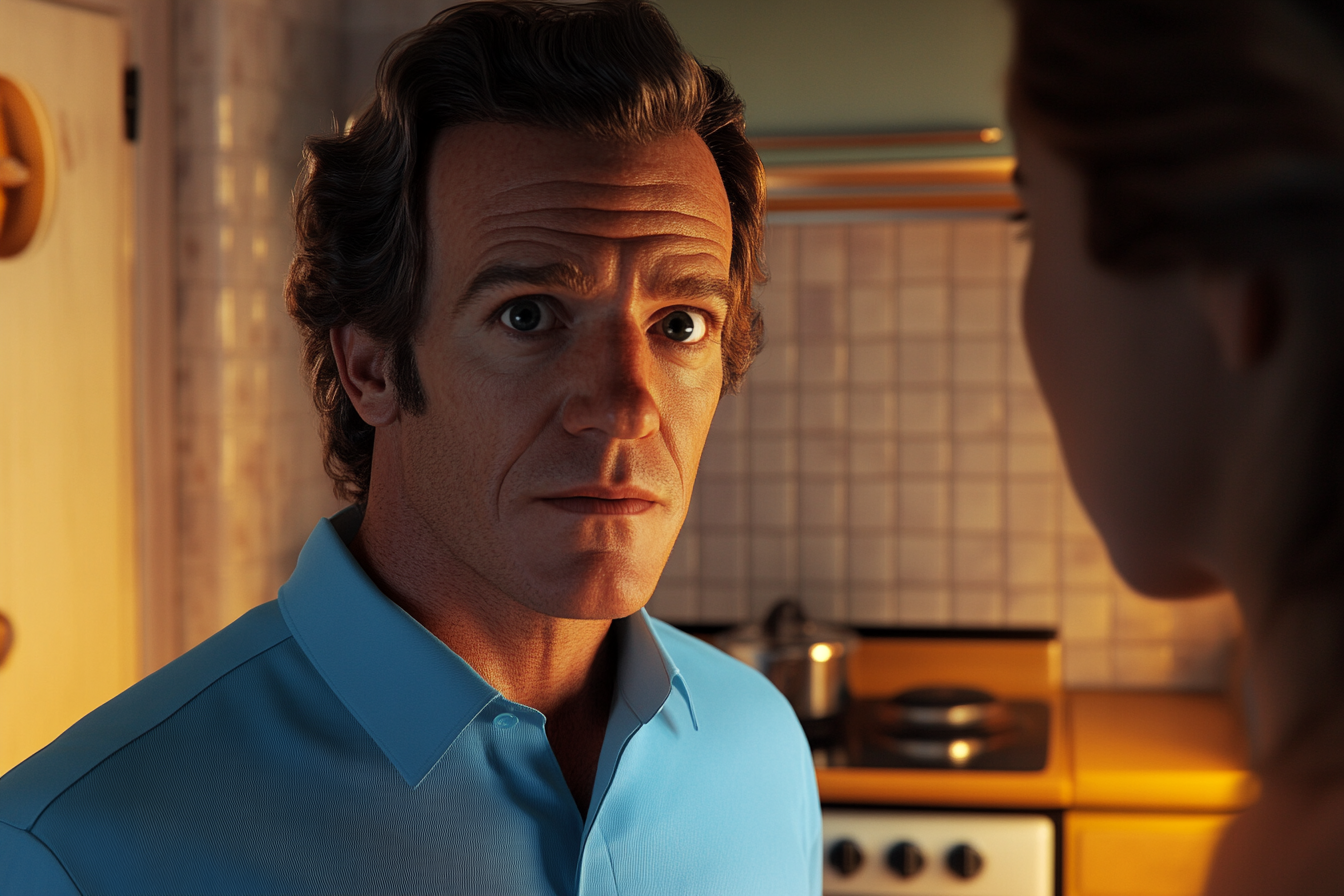
A man talking to his wife | Source: Midjourney
“I gave the money to my mother because she needed it to buy a country house. It’s an investment, really. She said it’ll be ours when she passes, and until then, she’ll rent it out for income. She needed it more than us right now.”
For a moment, I didn’t react. I just stood there as I tried to process what he’d just said.
“You what?” My voice came out in a low whisper, though it sounded like it was coming from a million miles away.

A woman confronting her husband | Source: Midjourney
Mark shifted on his feet, as if he were trying to downplay the gravity of what he’d just admitted.
“It’s not a big deal, Jess,” he said. “She’s family. And you know, the house will eventually be ours anyway. It’s like an early inheritance.”
“An early inheritance?” I repeated. “Are you serious?”
“Yes!” He gestured with his hands like he was explaining something to a child. “She’s going to rent it out, and the income will help her cover expenses. And when the time comes…”
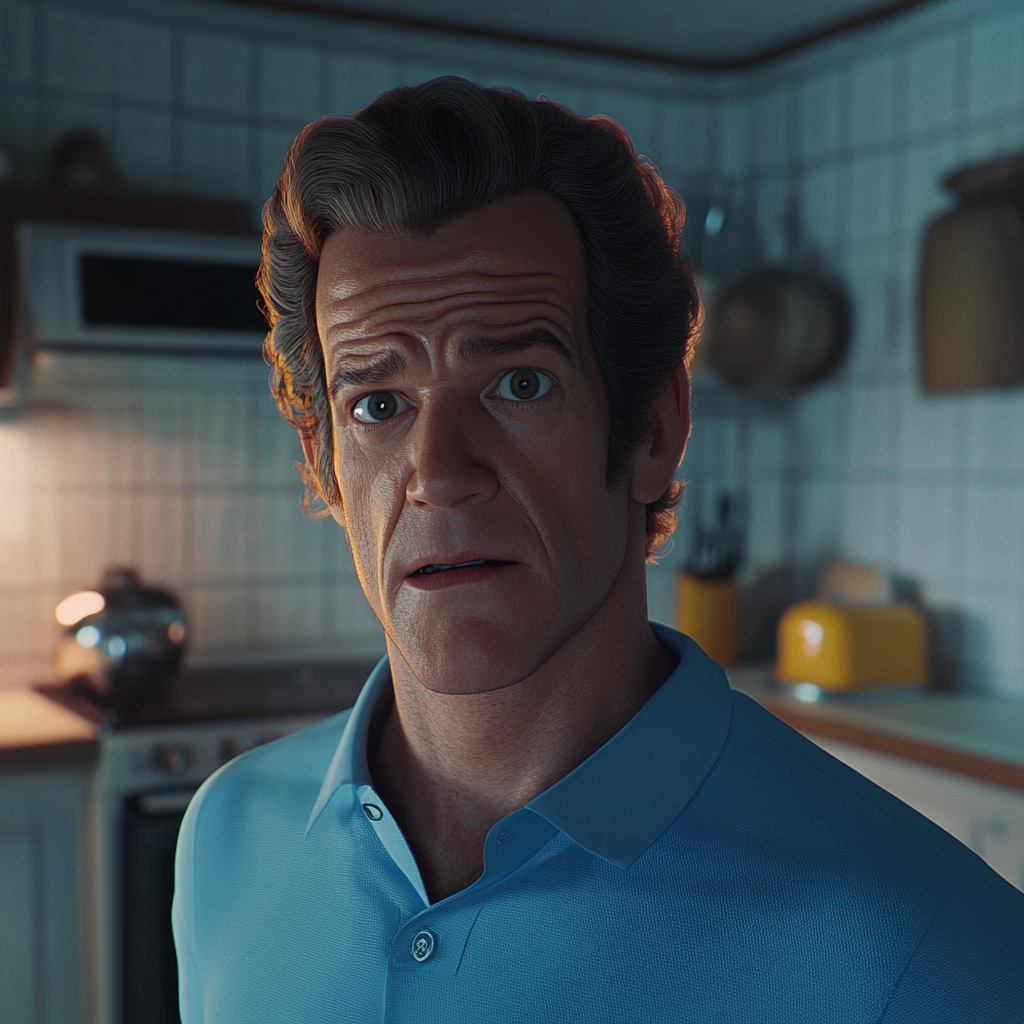
A man looking straight ahead | Source: Midjourney
“When the time comes?” I interrupted, slamming my hands down on the kitchen counter. “Mark, that was our money! Money we worked for, saved for, and planned to use for emergencies. For us. Not for your mother to play landlord with!”
“It’s not like we needed it right now,” he muttered, avoiding my eyes.
“Not like we needed it right now?” I repeated, my voice rising. “Mark, you didn’t even ask me! You emptied our savings account, our life savings, without so much as a conversation. Do you have any idea how betrayed I feel right now?”

A woman standing in her kitchen | Source: Midjourney
“It’s not like I was trying to hurt you, Jess,” he said. “I thought you’d understand.”
“Understand?” I laughed. “You think I’d understand you giving away all our money to your mother? For a house? Without even consulting me?”
Mark sighed, rubbing his temples like he was the one who had to deal with the problem. “Look, I know it seems bad now, but in the long run, this is a good thing for the family. She’s family, Jess. She needed help.”
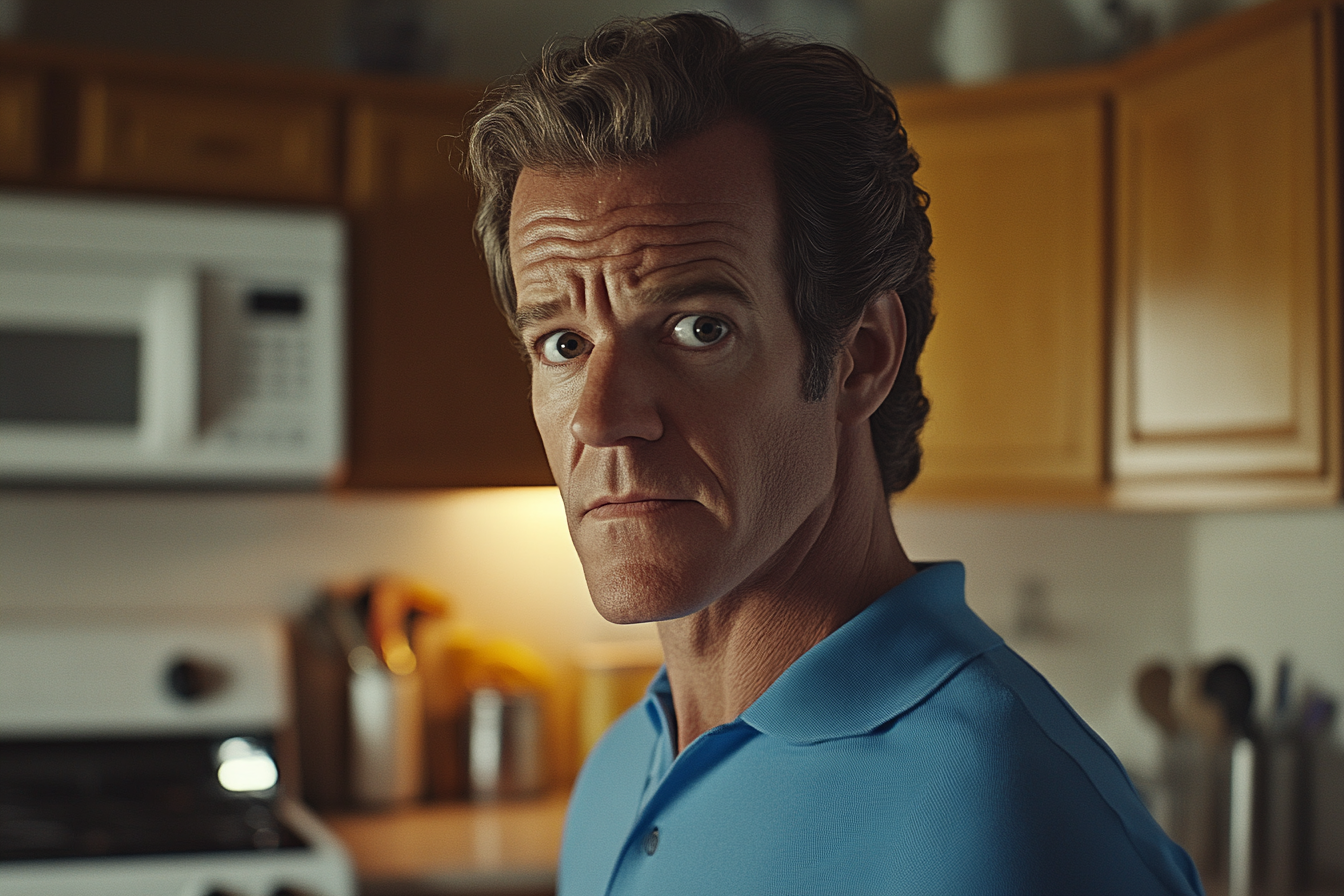
A worried man standing in a kitchen | Source: Midjourney
“And what about this family, Mark?” I shot back, motioning between the two of us. “What about the future we’re supposed to be building together? Do I not matter in your plans for the ‘long run’?”
“It’s not like that,” he began. “I just didn’t want to burden you with the decision. I thought…”
“You thought wrong,” I cut him off.

An angry woman | Source: Midjourney
I stared at him as my eyes searched for some hint of remorse. Some sign that he realized just how much damage he’d done.
But all I saw was a man who thought he’d done the right thing, even if it meant betraying his partner.
That’s when I knew.
If Mark couldn’t see the problem here, I would have to make him see it. And I would have to do it in a way he’d never forget.
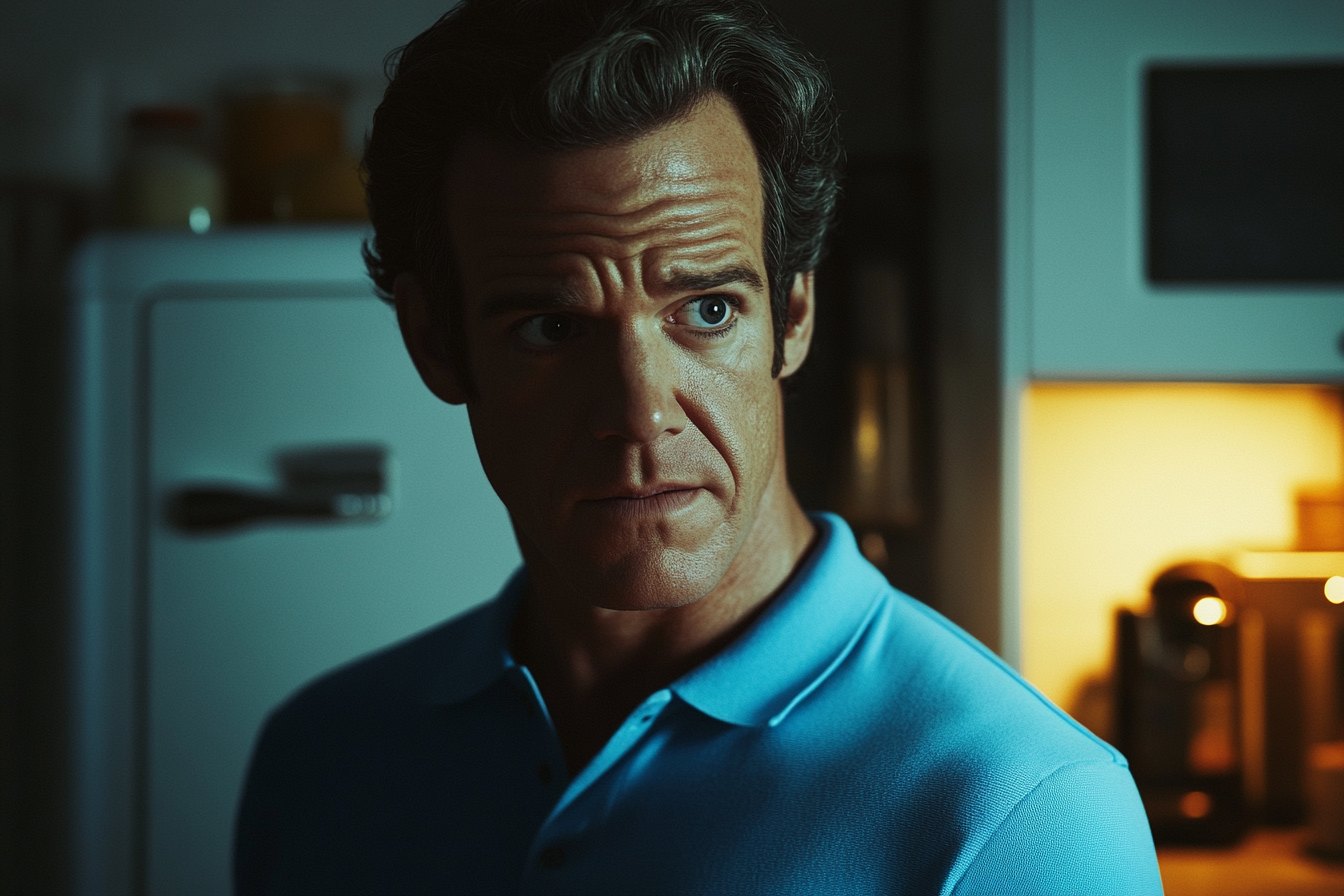
A man in his house | Source: Midjourney
The next morning, I woke up with a clear head and a sharper resolve than I’d felt in years. Mark had crossed a line, and if he thought a half-hearted apology and some empty promises would fix this, he had another thing coming.
I started by gathering information.
You see, revenge isn’t about anger. It’s about strategy. And my strategy required precision.
First, I paid a visit to the county records office.
It didn’t take long to find what I was looking for. I was there for Melissa’s new country house, purchased outright with our hard-earned savings.

A close-up shot of a woman’s face | Source: Midjourney
That was the first time I saw the property. It was a small but picturesque house with a neatly fenced yard. I made a copy of every document I could find and left without a shred of guilt.
Next, I scheduled a meeting with the bank manager.
It turns out that Mark had made one critical oversight: while he’d emptied the bulk of our savings, he hadn’t closed the account entirely. There were still a few hundred dollars left, and more importantly, my name was still attached to the account.

A woman counting money | Source: Pexels
Legally, I had just as much claim to the funds and the assets they’d been used to purchase, as he did.
With the bank’s information in hand, I moved on to the next phase of my plan.
I hired a lawyer, but it wasn’t just any lawyer. It was the best one in town.
A sharp, no-nonsense woman named Linda who had a reputation for leaving no stone unturned.

A lawyer standing in her office | Source: Pexels
“Let me get this straight,” Linda said during our first meeting. “Your husband used joint funds to buy a house for his mother, without your knowledge or consent?”
“That’s right,” I replied.
Linda’s eyes gleamed. “Well, that’s a textbook breach of fiduciary duty in a marriage. We can work with this.”
Over the next few weeks, Linda and I built our case.

A lawyer going through documents | Source: Pexels
In states that follow equitable distribution laws, any asset purchased during a marriage, even if it’s in someone else’s name, can be considered marital property if joint funds were used.
Mark had no idea that his “investment” had essentially tied Melissa’s precious house to our divorce proceedings.
While I worked quietly behind the scenes, Mark went about his days as though nothing had happened. I guess he believed the storm had passed, and I let him think that.
Two months later, everything was ready. The court proceedings had been tense, to say the least.

A judge signing documents | Source: Pexels
Mark had been served with the divorce papers and had hired his own lawyer, who tried to argue that the house was solely his mother’s property. But the evidence was undeniable. Our joint funds had been used to purchase the house, and as such, it was considered marital property.
The judge ultimately ruled that Mark’s actions had breached his responsibilities as a spouse by unilaterally using our savings without my consent.
As part of the divorce settlement, I was granted half ownership of the property.
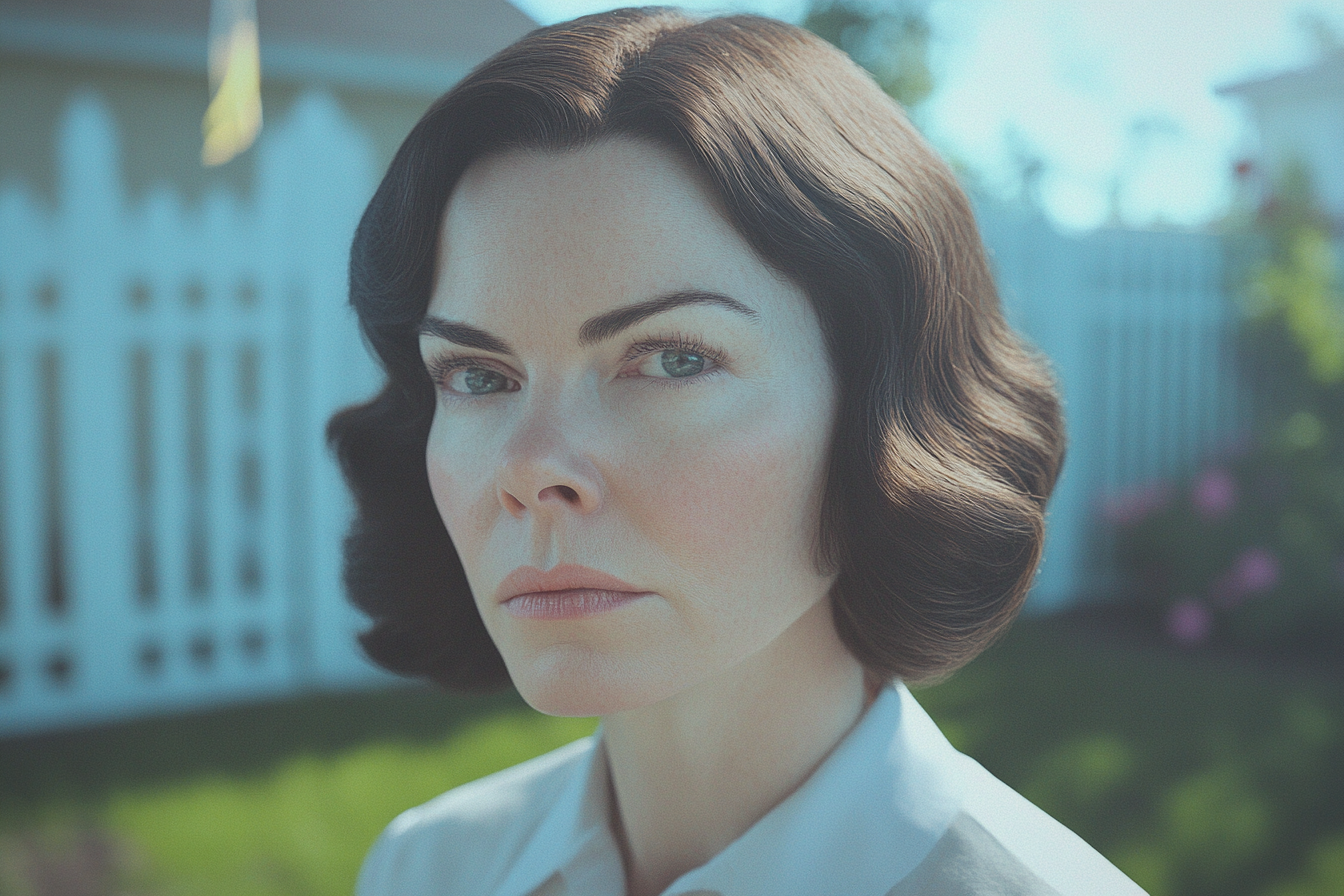
A woman standing outside a house | Source: Midjourney
Mark’s reaction in court was explosive. As the judge ruled in my favor, he slammed his hands on the table, his face red with rage.
“This is ridiculous!” he shouted, glaring at me like I’d betrayed him. His lawyer tried to calm him, but Mark’s fury only grew.
“You’re destroying this family, Jessica!” he spat as we left the courtroom.
“Oh no, Mark,” I said coolly. “You did that all on your own.”

A woman standing in a court | Source: Midjourney
A few weeks later, I drove out to the country house while Melissa was out of town.
Over there, I met Steve, the man who wanted to purchase my half of the house. We finalized the deal right there, while Melissa and Mark had no idea what I was up to.

A man signing papers | Source: Pexels
A week later, Melissa returned and found Steve’s pickup truck parked in the driveway, three dogs lounging in the yard, and a bonfire pit smoldering in the back.
She called me, screaming, “What have you done?”
“I sold my half, Melissa,” I said calmly. “It’s not my problem anymore.”
Mark called next, ranting about “family betrayal,” but I hung up mid-sentence.
Now divorced, I’ve never felt freer. My revenge was complete, and for once, the cost was all theirs to bear.

A woman standing in her house | Source: Midjourney
If you enjoyed reading this story, here’s another one you might like: When Ella hears strange noises coming from her attic while her husband, Aaron, is away, she fears the worst. But nothing could prepare her for the shocking discovery of her mother-in-law, Diane, hiding upstairs… What is going on?
This work is inspired by real events and people, but it has been fictionalized for creative purposes. Names, characters, and details have been changed to protect privacy and enhance the narrative. Any resemblance to actual persons, living or dead, or actual events is purely coincidental and not intended by the author.
The author and publisher make no claims to the accuracy of events or the portrayal of characters and are not liable for any misinterpretation. This story is provided “as is,” and any opinions expressed are those of the characters and do not reflect the views of the author or publisher.



Leave a Reply